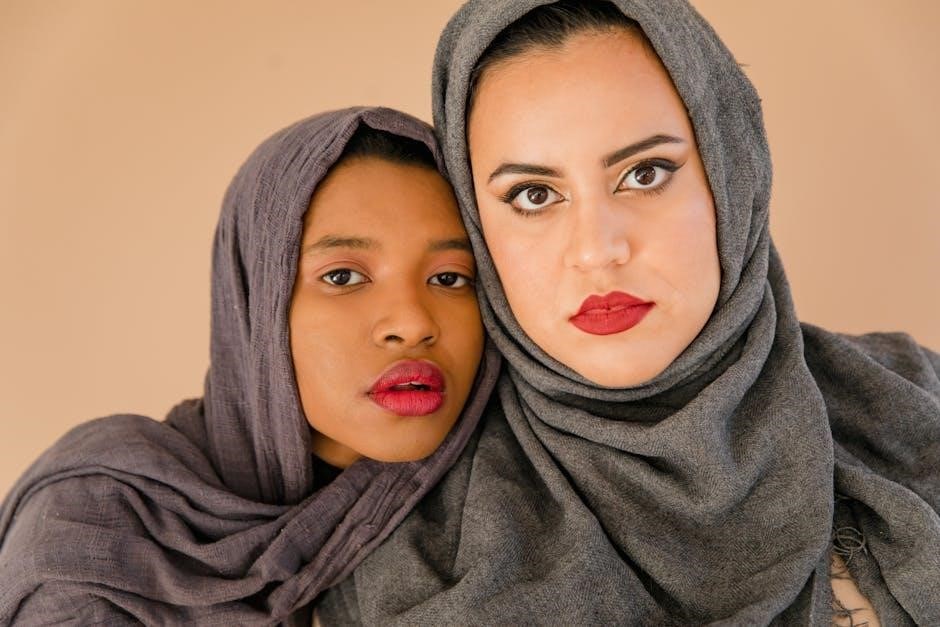Halal intimacy, from the Islamic perspective, is a comprehensive guide addressing sensitive topics within marriage․ The book provides clarity on permissible acts, emotional connection, and spiritual harmony, ensuring intimacy aligns with Islamic teachings․
Definition and Significance of Halal Intimacy
Halal intimacy refers to permissible physical and emotional closeness between spouses within Islamic boundaries․ It emphasizes mutual respect, consent, and adherence to divine guidelines, fostering a healthy and fulfilling marriage․ This concept is vital as it ensures intimacy aligns with Islamic values, promoting trust and spiritual harmony in relationships․ By understanding halal intimacy, couples can navigate marital challenges with clarity and confidence, strengthening their bond while honoring their faith․
The Importance of Understanding Intimacy in Islam
Understanding intimacy in Islam is crucial for fostering a balanced and respectful marital relationship․ Islamic teachings provide clear guidelines on permissible acts, ensuring physical and emotional closeness align with divine principles․ This knowledge helps couples navigate sensitive topics with confidence, preventing misunderstandings and strengthening their bond․ By adhering to Islamic values, spouses can maintain a healthy and fulfilling connection, honoring both their faith and each other․ This understanding is essential for building a harmonious and spiritually enriching marriage․

Islamic Perspective on Marriage and Intimacy
Islamic teachings regard marriage as a sacred bond, emphasizing intimacy not only for procreation but also for fostering emotional and spiritual connection, governed by clear guidelines․
Marriage as a Sacred Bond in Islam
Marriage in Islam is viewed as a sacred contract, fostering a deep, spiritual connection between spouses․ It is not merely a physical or emotional bond but a divine institution aimed at promoting mutual respect, trust, and harmony․ The union is designed to provide a stable environment for personal growth, companionship, and the nurturing of a family; Islamic teachings emphasize that marriage extends beyond procreation, serving as a means to attain emotional and spiritual fulfillment․ This sacred bond is strengthened by mutual rights, responsibilities, and adherence to Islamic principles, ensuring a balanced and fulfilling relationship․
Intimacy Beyond Procreation: Emotional and Spiritual Connection
Islamic teachings highlight that intimacy transcends mere procreation, focusing on fostering a profound emotional and spiritual bond between spouses․ This connection is essential for a harmonious marriage, emphasizing mutual affection, trust, and understanding․ By prioritizing emotional intimacy, couples strengthen their relationship, creating a foundation of companionship and support․ Spiritual connection deepens this bond, as shared acts of worship and mutual encouragement in faith further unify the partners․ This holistic approach ensures that intimacy serves both the heart and the soul, aligning with Islamic values of love, respect, and togetherness in marriage․
Spiritual Foundations of Intimacy
Islamic teachings emphasize that intimacy is a divine gift, fostering a deep spiritual connection between spouses․ It is rooted in mutual respect, trust, and a shared commitment to faith․ Intimacy, when approached with mindfulness and gratitude, strengthens the marital bond and reflects the harmony Allah intended for believers․ By integrating acts of worship, such as prayer and remembrance of Allah, couples elevate their relationship, ensuring it aligns with Islamic values and fosters a spiritually fulfilling union․
Rights and Responsibilities of Spouses
In Islam, spouses have mutual rights and responsibilities that foster a balanced and harmonious relationship․ A husband is obligated to provide emotional and financial support, while a wife is entitled to kindness and respect․ Intimacy must be consensual, ensuring both partners feel valued and comfortable․ Islamic teachings emphasize the importance of fulfilling each other’s needs, promoting a relationship built on trust, compassion, and shared faith․ Adhering to these principles ensures intimacy remains halal and strengthens the marital bond, reflecting the divine wisdom in Islamic family life․
Love and Affection in Islamic Teachings
Islamic teachings emphasize the divine importance of love and affection in marriage․ The Prophet Muhammad (peace be upon him) taught that treating one’s spouse with kindness and compassion is a fundamental aspect of faith․ The Quran describes spouses as garments for each other, symbolizing comfort, protection, and mutual support․ Love and affection are not merely emotional but also spiritual, fostering a deep connection between partners․ Islam encourages couples to nurture this bond through consistent expressions of care and tenderness, ensuring a fulfilling and harmonious marital relationship that aligns with divine guidance․

Legal and Ethical Guidelines
Islamic law outlines clear guidelines for intimacy, emphasizing permissible acts and ethical behavior․ It ensures intimacy aligns with divine teachings, fostering a respectful and spiritually grounded relationship․
Prohibited Acts in Intimacy
In Islam, certain acts within marital intimacy are strictly prohibited․ These include anal sex, adultery, and any form of sexual interaction outside a valid marriage․ Islamic law emphasizes the importance of respecting boundaries and avoiding harm to one’s spouse․ Forbidden acts are clearly defined to protect the sanctity of marriage and ensure that intimacy remains within the bounds of halal․ These guidelines are rooted in the teachings of the Quran and Sunnah, promoting a respectful and consensual relationship․ Adherence to these principles is essential for maintaining a pure and spiritually aligned marital bond․
Permissible Acts and Islamic Rulings
In Islam, permissible intimate acts within marriage are governed by clear rulings to ensure harmony and respect․ Oral sex, kissing, and other forms of affection are allowed as long as they are performed respectfully and consensually․ These acts are considered halal when they strengthen the marital bond and avoid harm or transgression; Islamic teachings emphasize moderation and mutual satisfaction, guiding couples to maintain intimacy within the framework of divine principles․ The Quran and Sunnah provide detailed guidance to ensure these interactions align with moral and ethical standards․
Maintaining Intimacy in Marriage
Halal intimacy emphasizes fostering emotional and physical connection through open communication, affection, and mutual respect, guided by Islamic principles to nurture a lasting, harmonious relationship․
Communication and Emotional Intimacy
Effective communication and emotional intimacy are vital in maintaining a harmonious marital relationship․ Islam emphasizes the importance of open dialogue, mutual respect, and emotional support between spouses․ Couples are encouraged to foster trust and understanding, which strengthens their bond and promotes a deeper connection․ Emotional intimacy, rooted in affection and companionship, is seen as a foundation for a fulfilling marriage․ By prioritizing these aspects, spouses can create a nurturing environment that aligns with Islamic values, ensuring a balanced and rewarding relationship․
Practical Tips for a Healthy Relationship
Building a healthy relationship requires mutual respect, understanding, and open communication․ Regularly schedule quality time together, fostering emotional intimacy through shared activities and meaningful conversations․ Practice active listening and express gratitude to strengthen your bond․ Address conflicts amicably, seeking solutions that honor both partners․ Prioritize spiritual growth together, such as engaging in joint prayers or discussions about Islamic values․ Maintain a balance between physical and emotional closeness, ensuring both aspects of intimacy are nurtured․ Seek guidance from Islamic scholars when challenges arise, ensuring your relationship remains aligned with divine teachings․

Health and Hygiene in Intimacy
Islam emphasizes cleanliness and hygiene in intimate relations․ Proper grooming and purification practices are essential for maintaining physical and spiritual purity, ensuring a healthy and respectful connection․
Islamic Emphasis on Cleanliness
Islam places great importance on cleanliness, both physically and spiritually, in all aspects of life, including intimacy․ The Quran and Sunnah provide specific guidelines for personal hygiene, such as the use of water for purification and maintaining modesty․ These practices are not only about physical cleanliness but also reflect a deeper spiritual purity, ensuring that intimate relations are conducted in a manner that honors both partners and their faith․
Health Considerations in Intimate Relations
Islamic teachings emphasize the importance of health and well-being in intimate relations․ Spouses are encouraged to maintain physical cleanliness and hygiene to ensure a healthy relationship․ The Prophet Muhammad (peace be upon him) stressed the importance of cleanliness in all aspects of life, including intimate relations․ This includes proper hygiene practices, such as using water for purification, and avoiding harmful behaviors that could lead to physical or emotional harm․ By prioritizing health, couples can foster a strong and fulfilling marital bond that aligns with Islamic values․
Addressing Common Issues
Halal intimacy addresses common marital challenges, providing Islamic guidance on resolving conflicts and fostering understanding between spouses, ensuring a harmonious and spiritually fulfilling relationship․
Overcoming Intimacy Challenges
Islamic teachings emphasize the importance of addressing intimacy challenges with patience and understanding․ Couples are encouraged to communicate openly, fostering emotional and spiritual connection․ The book Halal Intimacy: From the Islamic Perspective provides practical advice, such as seeking guidance from scholars and adhering to Islamic principles․ It highlights the need for mutual respect and affection, ensuring intimacy remains a source of strength and harmony in marriage․ By aligning actions with Islamic values, couples can overcome challenges and build a fulfilling relationship․
Seeking Guidance from Islamic Scholars
Seeking guidance from Islamic scholars is crucial for understanding halal intimacy․ Their insights, based on Quranic teachings and Hadith, provide couples with a clear framework for navigating intimate relationships respectfully and within Islamic boundaries․ Scholars emphasize mutual respect, affection, and the importance of maintaining dignity in marital interactions․ Resources like Halal Intimacy: From the Islamic Perspective offer practical advice, ensuring that couples can address challenges while adhering to religious guidelines․ This approach fosters a balanced and fulfilling marital relationship․

Comparative Perspectives
Halal intimacy differs from Western views, emphasizing modesty and religious guidelines․ Islamic teachings focus on permissible acts within marriage, contrasting with Western emphasis on personal freedom and autonomy in intimacy․
Halal Intimacy vs․ Western Views
Halal intimacy adheres to Islamic principles, emphasizing modesty, consent, and specific guidelines, while Western views often prioritize personal freedom and autonomy․ Unlike Western perspectives that may separate intimacy from spirituality, Halal intimacy integrates emotional and spiritual connection as part of a sacred marital bond․ This approach ensures that physical intimacy aligns with moral and ethical standards, fostering a deeper, more holistic relationship between spouses․ The contrast lies in the emphasis on religious guidelines versus individual freedom, reflecting differing cultural and value systems․
Cultural and Religious Differences
Cultural and religious differences significantly influence perceptions of intimacy․ Islamic teachings emphasize modesty, gender roles, and specific guidelines for marital relations, contrasting with Western views that often prioritize individual freedom and autonomy․ While Western cultures may view intimacy as a personal choice with fewer restrictions, Islam provides structured principles to ensure intimacy aligns with moral and spiritual values․ These differences reflect broader cultural norms, with Islam focusing on honoring marriage and preventing harm, while Western perspectives may prioritize personal expression and equality in relationships․ Understanding these distinctions fosters mutual respect and awareness․
Halal intimacy balances spirituality and physical connection, fostering a fulfilling marriage aligned with Islamic values․ It emphasizes mutual respect, emotional bonding, and adherence to divine guidelines for a harmonious relationship․
Balance Between Spirituality and Physical Intimacy
Balancing Spirituality and Physical Intimacy
Islam integrates spirituality and physical intimacy, ensuring both aspects enrich the marital bond․ Intimacy is not merely physical but a means to strengthen emotional and spiritual connection, fostering a deeper relationship with Allah․ By adhering to Islamic guidelines, couples can experience intimacy that aligns with divine will, promoting mutual respect, affection, and harmony in their relationship․ This balance ensures that physical expressions of love are meaningful and contribute to a fulfilling, spiritually grounded marriage․
The Role of Halal Intimacy in a Fulfilling Marriage
Halal intimacy plays a vital role in fostering a fulfilling marriage by nurturing emotional and spiritual connections between spouses․ It ensures that physical expressions of love are rooted in mutual respect, affection, and adherence to Islamic teachings․ By prioritizing halal practices, couples can strengthen their bond, creating a relationship that is both satisfying and spiritually enriching․ This approach to intimacy ensures harmony, trust, and a deeper connection, ultimately contributing to a lifelong, blissful union grounded in faith and mutual understanding․